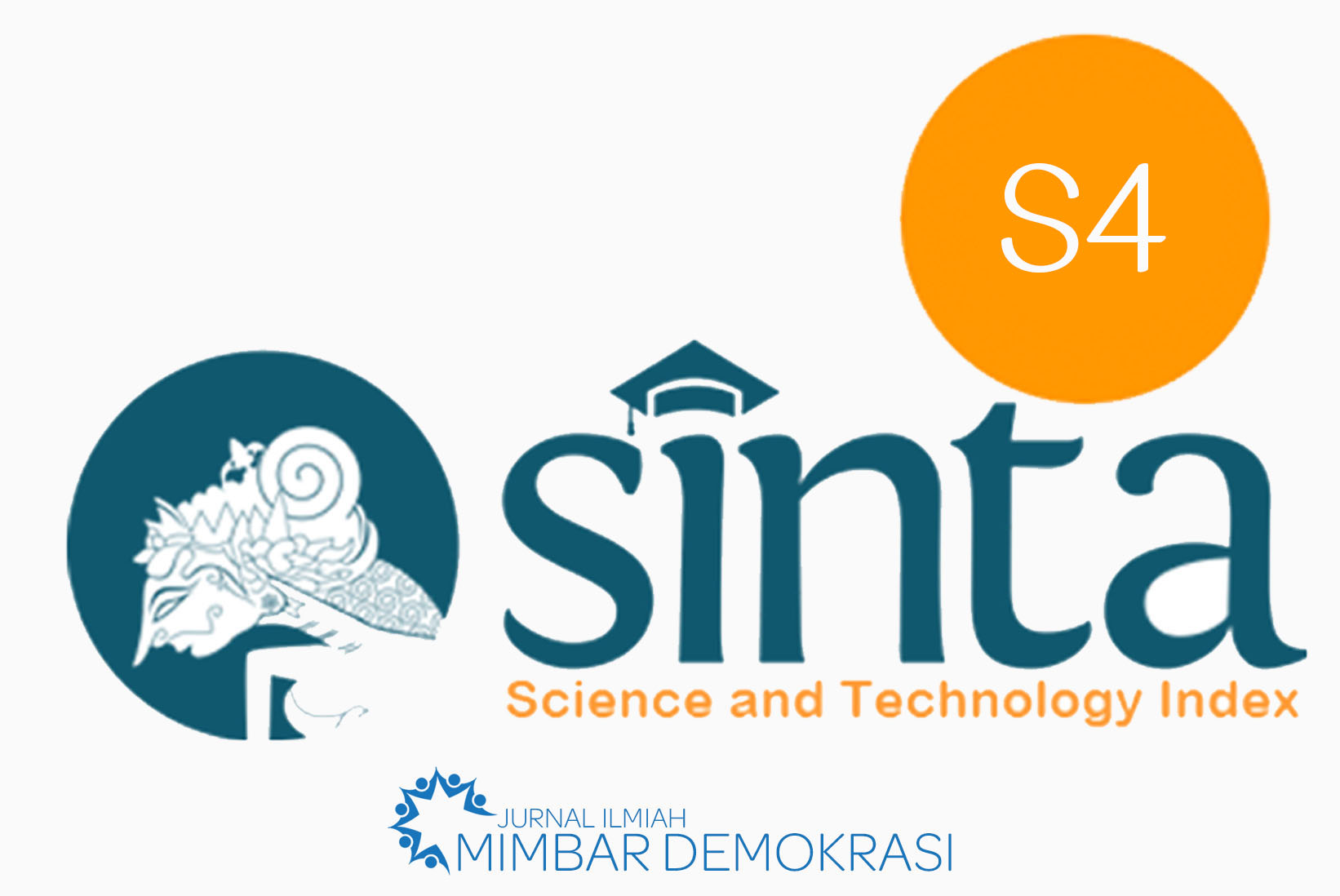Demokrasi dan ketimpangan pendapatan di Indonesia
Democracy and Income Inequality in Indonesia.
Abstract
Abstract: The concept of democracy and income inequality has become a topic of study by many economists around the world, both in isolation and in conjunction with other concepts in the field of economics. The fifth principle of Pancasila states "Social justice for all Indonesian people". When viewed from the aspect of income, justice means equality. This study aims to analyze the effect of the Indonesian Democracy Index on Income Inequality in 34 provinces in Indonesia from 2009 to 2019. The Democracy Index is examined through its three aspects (Civil Liberties, Political Rights, and Democratic Institutions), and Income Inequality is measured by the Indonesian Gini Index. The effect of IDI on IGI was analyzed by using the Fixed Effect Model using data quoted from official sources, which is the Central Bureau of Statistics. The results of the Multiple Linear Regression estimation show that 15 provinces get a positive value where the rise in IDI is followed by a rise in IGI and 19 provinces show a negative value which means that the rise in IDI is not followed by a rise in IGI (Income Inequality). The disaggregation of the democracy index in this study is expected to provide a clear picture of the relationship between civil liberties, political rights and democratic institutions with income inequality, so that appropriate policies can be formulated to address income inequality in Indonesia.
Abstrak: Konsep demokrasi dan ketimpangan pendapatan telah menjadi topik kajian dari banyak ahli ekonomi di seluruh dunia, baik secara sendiri maupun dalam hubungannya dengan konsep-konsep lain dalam bidang ekonomi. Jika dilihat dari Sila Kelima Pancasila yang berbunyi “Keadilan sosial bagi seluruh rakyat Indonesia”, maka keadilan adalah pemerataan atau equality dalam memperoleh pendapatan yang adil, sesuai dengan kegiatan yang dilakukannya. Penelitian ini bertujuan menganalisis pengaruh Indeks Demokrasi Indonesia terhadap Ketimpangan Pendapatan pada 34 provinsi di Indonesia dari tahun 2009 sampai 2019. Indeks Demokrasi diteliti melalui ketiga aspeknya (Kebebasan Sipil, Hak-hak Politik, dan Lembaga Demokrasi), dan Ketimpangan Pendapatan diukur dengan Indeks Gini Indonesia. Pengaruh IDI terhadap IGI dianalisis dengan menggunakan Fixed Effect Model dengan menggunakan data yang dikutip dari sumber resmi Biro Pusat Statistik. Hasil estimasi Regresi Linier Berganda menunjukkan bahwa 15 provinsi memperoleh nilai positif di mana kenaikan IDI diikuti kenaikan IGI dan 19 provinsi menunjukkan nilai negatif yang berarti kenaikan IDI tidak diikuti kenaikan IGI (Ketimpangan Pendapatan). Disagregasi indeks demokrasi dalam penelitian ini diharapkan dapat memberikan gambaran yang jelas mengenai keterkaitan kebebasan sipil, hak politik dan kelembagaan demokrasi dengan ketimpangan pendiapatan, sehingga dapat diformulasikan kebijakan yang tepat untuk mengatasi ketimpangan pendapatan di Indonesia.
References
Acemoglu, D., & Robinson, J. A. (2011). Persistence of Power, Elites, and Institutions. SSRN Electronic Journal. https://doi.org/10.2139/ssrn.888187
Bahamonde, H., & Trasberg, M. (2021). Inclusive institutions, unequal outcomes: Democracy, state capacity, and income inequality. European Journal of Political Economy, 70. https://doi.org/10.1016/j.ejpoleco.2021.102048
Basri, F. (2021). Demokrasi dan Pembangunan Ekonomi. https://faisalbasri.com/2021/04/19/demokrasi-dan-pembangunan-ekonomi/
Boix, C. (2015). Democracy and redistribution. In Democracy and Redistribution. https://doi.org/10.2139/ssrn.2722886
Dorsch, M. T., & Maarek, P. (2019). Democratization and the conditional dynamics of income distribution. American Political Science Review, 113(2). https://doi.org/10.1017/S0003055418000825
Dorsch, M. T., & Maarek, P. (2020). Economic downturns, inequality, and democratic improvements. European Journal of Political Economy. https://doi.org/10.1016/j.ejpoleco.2020.101856
García-Castro, J. D., Willis, G. B., & Rodríguez-Bailón, R. (2019). I know people who can and who cannot: A measure of the perception of economic inequality in everyday life. Social Science Journal, 56(4). https://doi.org/10.1016/j.soscij.2018.09.008
Goffe, N. V., & Monusova, G. A. (2019). Misperception of social realities: Political implications. World Economy and International Relations, 63(8). https://doi.org/10.20542/0131-2227-2019-63-8-91-101
Hartwell, C. A., Horvath, R., Horvathova, E., & Popova, O. (2019). Democratic Institutions, Natural Resources, and Income Inequality. Comparative Economic Studies, 61(4). https://doi.org/10.1057/s41294-019-00102-2
Hassan, M. S., Mahmood, H., Saeed, M. I., Alkhateeb, T. T. Y., Arshed, N., & Mahmoud, D. H. I. (2021). Investment portfolio, democratic accountability, poverty and income inequality nexus in pakistan: A way to social sustainability. Sustainability (Switzerland), 13(11). https://doi.org/10.3390/su13116411
Krasota, O., & Melnyk, T. (2020). Social inclusion as an instrument for reducing socio-economic inequality. Scientific Papers of the University of Pardubice, Series D: Faculty of Economics and Administration, 28(3). https://doi.org/10.46585/SP28031192
Lesschaeve, C. (2021). Bringing representatives back in: How political parties moderate patterns of inequality in opinion representation. European Political Science. https://doi.org/10.1057/s41304-021-00332-y
Liddle, R. W. (2021). Democracy in Indonesia: From Stagnation to Regression?ThomasPower and EveWarburton (eds.), Institute of Southeast Asian Studies, Singapore, 2020, Pp. 393 + xvi, ISBN: 978‐981‐4881‐51‐7 (hard cover). Asian-Pacific Economic Literature, 35(1). https://doi.org/10.1111/apel.12324
Lipps, J., & Schraff, D. (2021). Regional inequality and institutional trust in Europe. European Journal of Political Research, 60(4). https://doi.org/10.1111/1475-6765.12430
Lundberg, A. L., Huynh, K. P., & Jacho-Chávez, D. T. (2017). Income and Democracy: A Smooth Varying Coefficient Redux. Journal of Applied Econometrics, 32(3). https://doi.org/10.1002/jae.2536
Maryanti. (2019). Ketimpangan, Demokrasi dan Kriminalitas di Indonesia. Economics Bosowa, 5(001), 45–58.
Miljkovic, D. (2018). The Relationship between Individual and Institutional Freedom. Open Journal of Political Science, 08(02). https://doi.org/10.4236/ojps.2018.82007
Muhtadi, B., & Warburton, E. (2020). Inequality and democratic support in Indonesia. Pacific Affairs, 93(1). https://doi.org/10.5509/202093131
Nur, S. M. (2019). DEMOKRASI DAN TANTANGANNYA DALAM BINGKAI PLURALISME DI INDONESIA. Jurnal Ilmiah Mimbar Demokrasi, 19(01). https://doi.org/10.21009/jimd.v19i01.12950
Sánchez-Ancochea, D. (2020). Beyond a single model: Explaining differences in inequality within Latin America. Working Paper of the Helen Kellogg Institute for International Studies, 2020(434).
Scheve, K., & Stasavage, D. (2017). Wealth Inequality and Democracy. In Annual Review of Political Science (Vol. 20). https://doi.org/10.1146/annurev-polisci-061014-101840
Suaib, E., Husein, N., & Santoso, D. (2020). Be Aware of Inequality: Political Challenges and Redistributive Public Policies. Politik Indonesia: Indonesian Political Science Review, 5(1). https://doi.org/10.15294/ipsr.v5i1.21724
Zuazu, I. (2021). Electoral systems and income inequality: a tale of political equality. Empirical Economics. https://doi.org/10.1007/s00181-021-02154-9
Zulkarnaen, I. (2017). Socio-Political and Economic Determinants of Income Inequality In Indonesia. Jurnal Perencanaan Pembangunan: The Indonesian Journal of Development Planning, 1(3), 224–239. https://doi.org/https://doi.org/10.36574/jpp.v1i3.21
Copyright (c) 2022 Nurul Bariyah

This work is licensed under a Creative Commons Attribution-ShareAlike 4.0 International License.








